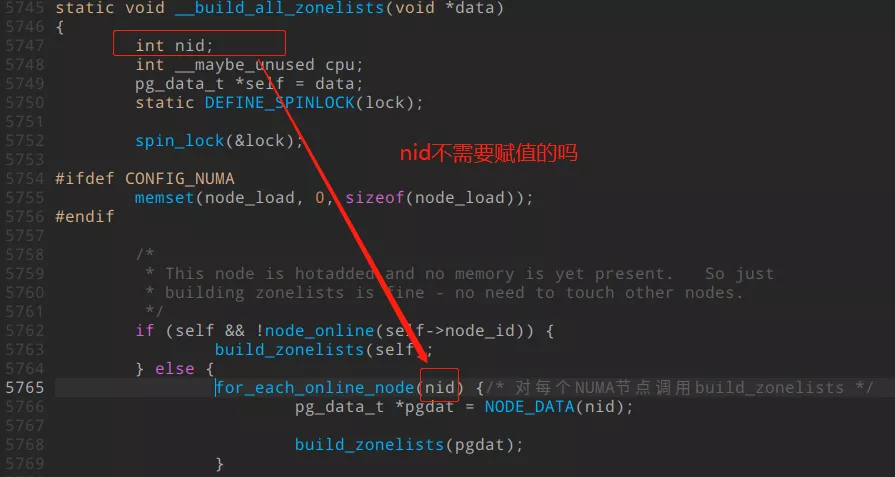為啥變量沒初始化就用了?那是宏定義啊!
一、問題
為啥內核有的變量沒有初始化就敢直接使用?
二、分析
看上圖,其中的5747行的變量nid的確沒有定義,就直接使用了,這么做沒有問題嗎?
其實大家仔細看一下,5765行是一個宏,
到內核源碼去找該宏的定義:linux-3.14\include\linux\Nodemask.h
- #define for_each_online_node(node) for_each_node_state(node, N_ONLINE)
其中的for_each_node_state又是一個宏, 繼續跟蹤該宏,有兩處定義
- 408 #if MAX_NUMNODES > 1
- ……
- 429 #define for_each_node_state(__node, __state) \
- 430 for_each_node_mask((__node), node_states[__state])
- ……
- 450 #else
- ……
- 470 #define for_each_node_state(node, __state) \
- 471 for ( (node) = 0; (node) == 0; (node) = 1)
- ……
- 481 #endif
究竟是哪一個定義,由條件#if MAX_NUMNODES > 1 來決定,
- #ifdef CONFIG_NODES_SHIFT
- #define NODES_SHIFT CONFIG_NODES_SHIFT
- #else
- #define NODES_SHIFT 0
- #endif
- #define MAX_NUMNODES (1 << NODES_SHIFT)
因為CONFIG_NODES_SHIFT沒有定義【可以檢索一下內核,找不到該宏的定義】,所以NODES_SHIFT 為0
所以 MAX_NUMNODES 為1;
所以 for_each_node_state 定義如下:
- 470 #define for_each_node_state(node, __state) \
- 471 for ( (node) = 0; (node) == 0; (node) = 1)
而此處的 node 對應 粉絲截圖的nid, __state 對應 N_ONLINE
所以5765行代碼,可以展開為
- for ( (nid) = 0; (nid) == 0; (nid) = 1)
可見,nid被定義了。
三、宏定義的注意點
宏定義是一個給定名稱的代碼片段,當我們使用這個名稱的時候,預處理器會自動將其替換為宏定義的內容。宏定義有兩種,一種是object-like宏定義,在使用的時候相當于一個數據對象;另一種是function-like,在使用的時候就像調用函數那樣。
1. 只占用編譯時間
宏展開會使源程序變長,但是宏展開發生在編譯過程中,不占運行時間,只占編譯時間。
宏展開因為在預處理階段發生,不會分配內存。
2. 宏替換發生時機
編譯c源程序的過程:
- 預處理
- 編譯
- 匯編
- 連接
宏替換發生在編譯預處理階段。
3. 預處理包括哪些工作
預處理產生編譯器的輸出,實現功能如下
1)文件包含
把#include中包含的內容拓展為文件的正文,即找到.h文件,同時展開到#include所在處
2)條件編譯
根據#if和#ifdef等編譯命令,將源程序文件中的部分包含進來,部分排除,排除在外的一般轉換為空行
3)宏展開
將對宏的調用展開成相對應的宏定義
關于宏定義還有很多其他的知識點,本文暫不深入展開。
四、如何快速展開復雜的宏定義?
Linux內核中通常有很多宏定義,非常的復雜,對于初學者來說,經常會一頭霧水,那如何快速理解宏定義呢?
一口君教你一個非常方便的方法,讓你直接看透宏定義, 我們以上述代碼為例:
第一步
- 將要展開的宏先拷貝到c文件中,然后把所有用到的宏定義都拷貝到該文件中;
- 內核中很多的宏都是嵌套的,把嵌套的宏定義都一起拷貝到文件中;
- 此外內核很多的宏會由條件編譯決定,從而導致有多種定義方式, 如果不確定,就把條件編譯一起拷貝過來,
- 如該例所示,MAX_NUMNODES 就被嵌套了多級, 最終宏CONFIG_NODES_SHIFT在內核中沒有檢索到,所以該宏沒有定義。
文件如下:123.c
- 1
- 2
- 3 #ifdef CONFIG_NODES_SHIFT
- 4 #define NODES_SHIFT CONFIG_NODES_SHIFT
- 5 #else
- 6 #define NODES_SHIFT 0
- 7 #endif
- 8
- 9
- 10
- 11 #define MAX_NUMNODES (1 << NODES_SHIFT)
- 12
- 13
- 14
- 15
- 16 #if MAX_NUMNODES > 1
- 17 #define for_each_node_state(__node, __state) \
- 18 for_each_node_mask((__node), node_states[__state])
- 19 #else
- 20 #define for_each_node_state(node, __state) \
- 21 for ( (node) = 0; (node) == 0; (node) = 1)
- 22 #endif
- 23
- 24
- 25
- 26
- 27 #define for_each_online_node(node) for_each_node_state(node, N_ONLINE)
- 28
- 29
- 30 static int __build_all_zonelists(void *data)
- 31 {
- 32 int nid;
- 33 int cpu;
- 34 pg_data_t *self = data;
- 35
- 36
- 37
- 38 for_each_online_node(nid) {
- 39 pg_data_t *pgdat = NODE_DATA(nid);
- 40
- 41 build_zonelists(pgdat);
- 42 build_zonelist_cache(pgdat);
- 43 }
- 44 }
第二步
使用以下命令,展開宏定義,
- gcc -E
-E的含義是,編譯預處理該文件,但是不去生成匯編代碼,只把文件中的宏定義以及包含的頭文件替代,并不會去檢查語法正確與否。
結果如下:
- peng@ubuntu:~/test$ gcc 123.c -E
- # 1 "123.c"
- # 1 "<built-in>"
- # 1 "<command-line>"
- # 1 "/usr/include/stdc-predef.h" 1 3 4
- # 1 "<command-line>" 2
- # 1 "123.c"
- # 28 "123.c"
- static int __build_all_zonelists(void *data)
- {
- int nid;
- int cpu;
- pg_data_t *self = data;
- for ( (nid) = 0; (nid) == 0; (nid) = 1) {
- pg_data_t *pgdat = NODE_DATA(nid);
- build_zonelists(pgdat);
- build_zonelist_cache(pgdat);
- }
- }
由結果可知, nid是被賦值為0的。
五、練習
我們來做一個練習,展開一下內核的waite_event()這個宏
拷貝用到所有宏定義到c文件中。
wait.c
- 1
- 2 #define ___wait_event(wq, condition, state, exclusive, ret, cmd) \
- 3 ({ \
- 4 __label__ __out; \
- 5 wait_queue_t __wait; \
- 6 long __ret = ret; \
- 7 \
- 8 INIT_LIST_HEAD(&__wait.task_list); \
- 9 if (exclusive) \
- 10 __wait.flags = WQ_FLAG_EXCLUSIVE; \
- 11 else\
- 12 {\
- 13 /* code */ \
- 14 __wait.flags = 0; \
- 15 \
- 16 for (;;) { \
- 17 long __int = prepare_to_wait_event(&wq, &__wait, state);\
- 18 \
- 19 if (condition) \
- 20 break; \
- 21 \
- 22 if (___wait_is_interruptible(state) && __int) { \
- 23 __ret = __int; \
- 24 if (exclusive) { \
- 25 abort_exclusive_wait(&wq, &__wait, \
- 26 state, NULL); \
- 27 goto __out; \
- 28 } \
- 29 break; \
- 30 } \
- 31 \
- 32 cmd; \
- 33 } \
- 34 finish_wait(&wq, &__wait); \
- 35 __out: __ret; \
- 36 })\
- 37 }\
- 38
- 39
- 40
- 41
- 42 #define TASK_UNINTERRUPTIBLE 2
- 43
- 44
- 45 #define __wait_event(wq, condition) \
- 46 (void)___wait_event(wq, condition, TASK_UNINTERRUPTIBLE, 0, 0, \
- 47 schedule())\
- 48 \
- 49 \
- 50 wait_event(wq, condition) \
- 51 do { \
- 52 if (condition) \
- 53 break; \
- 54 __wait_event(wq, condition); \
- 55 } while (0)\
- 56
- 57
- 58
- 59 test()
- 60 {
- 62 wait_event(wq,flag == 0);
- 64 }
編譯與處理結果如下:
- root@ubuntu:/home/peng/test# gcc wait.c -E
- # 1 "wait.c"
- # 1 "<built-in>"
- # 1 "<command-line>"
- # 1 "/usr/include/stdc-predef.h" 1 3 4
- # 1 "<command-line>" 2
- # 1 "wait.c"
- # 71 "wait.c"
- test()
- {
- do { if (flag == 0) break; (void)({ __label__ __out; wait_queue_t __wait; long __ret = 0; INIT_LIST_HEAD(&__wait.task_list); if (0) __wait.flags = WQ_FLAG_EXCLUSIVE; else { __wait.flags = 0; for (;;) { long __int = prepare_to_wait_event(&wq, &__wait, 2); if (flag == 0) break; if (___wait_is_interruptible(2) && __int) { __ret = __int; if (0) { abort_exclusive_wait(&wq, &__wait, 2, NULL); goto __out; } break; } schedule(); } finish_wait(&wq, &__wait); __out: __ret; }) }; } while (0);
- }
函數test()整理如下:
- test(){
- do {
- if (flag == 0)
- break;
- (void)(
- {
- __label__ __out;
- wait_queue_t __wait;
- long __ret = 0;
- INIT_LIST_HEAD(&__wait.task_list);
- if (0) __wait.flags = WQ_FLAG_EXCLUSIVE;
- else {
- __wait.flags = 0;
- for (;;)
- {
- long __int = prepare_to_wait_event(&wq, &__wait, 2);
- if (flag == 0)
- break;
- if (___wait_is_interruptible(2) && __int)
- {
- __ret = __int;
- if (0)
- {
- abort_exclusive_wait(&wq, &__wait, 2, NULL);
- goto __out;
- }
- break;
- }
- schedule();
- }
- finish_wait(&wq, &__wait);
- __out:
- __ret;
- })
- };
- }while (0);
- }
這就是wait_event()最終被替換后的代碼,你學會了嗎?
六、16個經典宏定義小例子
數值相關的宏定義
1 閏年的判斷 ,年份可以整除4并且不能整除100,或者可以整除400,則為閏年;
- #define IS_LEAP_YEAR(y) (((((y) % 4) == 0) && (((y) % 100) != 0)) \
- || (((y) % 400) == 0))/*判斷是否是閏年*/
2 **MAX 與 MIN ** ;
- #define MAX(x, y) (((x) < (y)) ? (y) : (x)) /*兩數取最大數*/
- #define MIN(x, y) (((x) < (y)) ? (x) : (y)) /*兩數取最小數*/
3 BCD碼;
- #define BCD2HEX(x) (((x) >> 4) * 10 + ((x) & 0x0F)) /*BCD碼轉數值, 20H -> 20*/
- #define HEX2BCD(x) (((x) % 10) + ((((x) / 10) % 10) << 4)) /*數值轉BCD碼, 20 -> 20H*/
4 字符相關的宏定義
字符范圍判斷
- /*字符是否在某個區間范圍內*/
- #define in_range(c, lo, up) ((uint8)c >= lo && (uint8)c <= up)
- #define isprint(c) in_range(c, 0x20, 0x7f)
- /*十進制內字符*/
- #define isdigit(c) in_range(c, '0', '9')
- /*十六進制內字符*/
- #define isxdigit(c) (isdigit(c) || in_range(c, 'a', 'f') || in_range(c, 'A', 'F'))
- /*是否是小寫*/
- #define islower(c) in_range(c, 'a', 'z')
- /*是否是空格*/
- #define isspace(c) (c == ' ' || c == '\f' || c == '\n' || c == '\r' || c == '\t' || c == '\v')
- /*是否為ASCII碼*/
- #define isascii(c) ((unsigned) (c) <= 0177)
5 byte相關的宏定義
- #define MSB(x) (((x) >> 8) & 0xff) /* x占2byte(如short)2byte的高地址的1byte */
- #define LSB(x) ((x) & 0xff) /* x占2byte(如short)2byte的低地址的1byte*/
- #define MSW(x) (((x) >> 16) & 0xffff) /* x占4byte(如int) 4byte的高地址的2byte */
- #define LSW(x) ((x) & 0xffff)
- #define WORDSWAP(x) (MSW(x) | (LSW(x) << 16)) /* x占4byte(如int) 低2字節與高2字節內容交換 */
- #define LLSB(x) ((x) & 0xff) /*x占4byte(如int) 取低地址1byte*/
- #define LNLSB(x) (((x) >> 8) & 0xff)
- #define LNMSB(x) (((x) >> 16) & 0xff)
- #define LMSB(x) (((x) >> 24) & 0xff)
- /*x占4byte(如int) 4字節逆序*/
- #define LONGSWAP(x) ((LLSB(x) << 24) \
- |(LNLSB(x) << 16) \
- |(LNMSB(x) << 8) \
- |(LMSB(x)))
6 bit相關的宏定義
- /* 判斷某位是否為1 */
- #define BIT_IS_1(x,y) (((x)>>(y))&0x01u)
- #define SETBITS(x,y,n) (x) = (n) ? ((x)|(1 << (y))) : ((x) &(~(1 << (y))));
- /* 給某位置反 */
- #define BIT_INVERSE(x,y) ((x)=(x)^(1<<(y)))
- /* 字節串中某BIT值*/
- #define BIT_OF_BYTES(x, y) (BITS(x[(y)/8], (y)%8))
- /* 字節串中設置某BIT為0 */
- #define SETBITSTO0_OF_BYTES(x, y) (x[(y)/8]) &= (~(1 << ((y)%8)))
- /* 字節串中設置某BIT為1 */
- #define SETBITSTO1_OF_BYTES(x, y) (x[(y)/8]) |= (1 << ((y)%8))
7 數組與結構體相關的宏定義
- /* number of elements in an array */
- #define ARRAY_SIZE(a) (sizeof (a) / sizeof ((a)[0]))
- /* byte offset of member in structure*/
- #define MOFFSET(structure, member) ((int) &(((structure *) 0) -> member))
- /* size of a member of a structure */
- #define MEMBER_SIZE(structure, member) (sizeof (((structure *) 0) -> member))
8 對齊的宏定義
- /*向上對齊,~(align - 1)為對齊掩碼,例如align=8,~(align - 1) = ~7,
- (~7)二進制后三位為000,&(~(align - 1)) = &(~7),就是去掉余數,使其能被8整除*/
- #define ALIGN_UP(x, align) (((int) (x) + (align - 1)) & ~(align - 1))
- /*向下對齊*/
- #define ALIGN_DOWN(x, align) ((int)(x) & ~(align - 1))
- /*是否對齊*/
- #define ALIGNED(x, align) (((int)(x) & (align - 1)) == 0)
- /*頁面對齊相關的宏,一頁為4096字節*/
- #define PAGE_SIZE 4096
- #define PAGE_MASK (~(PAGE_SIZE-1))
- #define PAGE_ALIGN(addr) -(((addr)+PAGE_SIZE-1) & PAGE_MASK)
9 防止頭文件被重復包含
- #ifndef BODY_H //保證只有未包含該頭文件才會將其內容展開
- #define BODY_H
- //頭文件內容
- #endif
10 得到指定地址上的一個字節或者一個字
- #define MEM_B(x) (*(byte*)(x)) //得到x表示的地址上的一個字節
- #define MEM_W(x) (*(word*)(x)) //得到x表示的地址上的一個字
11 得到一個field在結構體中的偏移量
- #define OFFSET(type,field) (size_t)&((type*)0->field)
12 得到一個結構體中field所占用的字節數
- #define FSIZ(type,field) sizeof(((type*)0)->field)
13 得到一個變量的地址
- #defien B_PTR(var) ((byte*)(void*)&(var)) //得到字節寬度的地址
- #define W_PTR(var) ((word*)(void*)&(var)) //得到字寬度的地址
14 將一個字母轉換成大寫
- #define UPCASE(c) (((c) >= "a" && (c) <= "z") ? ((c) - 0x20) : (c) )
15 防止溢出
- #define INC_SAT(val) (val = ((val) +1 > (val)) ? (val) + 1 : (val))
16 返回數組元素的個數
- #define ARR_SIZE(a) (sizeof( (a) ) / sizeof(a[0]) ) )
































